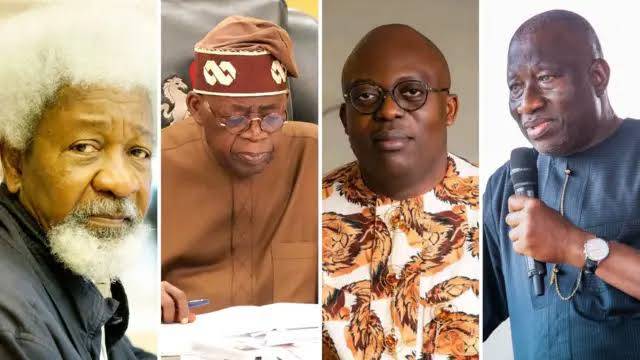Obasanjo, Jonathan, Soyinka On Rivers Emergency; Adeyanju Lauds Tinubu
The recent declaration of a state of emergency in Rivers State by President Bola Tinubu has sparked a heated debate among Nigeria's top leaders, including former Presidents Olusegun Obasanjo and Goodluck Jonathan, as well as Nobel laureate Wole Soyinka. The controversy surrounding the state of emergency has raised questions about the limits of presidential power, the principles of federalism, and the future of Nigeria's democratic system.
At the center of the debate is the suspension of elected officials in Rivers State, which Soyinka has condemned as contrary to the spirit of federalism. According to Soyinka, the declaration of a state of emergency in Rivers State is an overreach of presidential power, which undermines the principles of federalism and the autonomy of state governments.
Obasanjo, on the other hand, has been more circumspect in his comments, limiting himself to general remarks about the state of democracy in Africa. Speaking at the Emeka Ihedioha 60th birthday colloquium in Abuja, Obasanjo emphasized the need for definitional exactitude in understanding the concept of democracy. However, his remarks did not directly address the controversy surrounding the state of emergency in Rivers State.
Jonathan has also weighed in on the debate, criticizing the suspension of elected officials in Rivers State as capable of bringing Nigeria into disrepute. His comments reflect a broader concern about the implications of the state of emergency for Nigeria's democratic system and its reputation abroad.
The controversy surrounding the state of emergency in Rivers State has also sparked a wider debate about the role of the federal government in state affairs. Many have argued that the move is an overreach of presidential powers, which undermines the principles of federalism and the autonomy of state governments.
In response to the criticism, the presidency has defended the declaration of a state of emergency, arguing that it was necessary to restore order and stability in Rivers State. However, the opposition has dismissed this argument, claiming that the move is politically motivated and aimed at undermining the authority of the state government.
The debate over the state of emergency in Rivers State reflects a deeper crisis of confidence in Nigeria's democratic system. Many Nigerians are concerned about the erosion of democratic norms and the concentration of power in the hands of the federal government.
To address these concerns, Soyinka has called for a national conversation to address the issue of excessive presidential powers and the need for constitutional reform. He has emphasized the need for a more decentralized system of government, which would give greater autonomy to state governments and reduce the concentration of power in the hands of the federal government.
In a related development, human rights lawyer Deji Adeyanju has commended President Tinubu and the Nigeria Customs Service (NCS) for their recent decision to grant a two-year exemption on import duties and Value Added Tax (VAT) for essential raw materials used in healthcare manufacturing. The policy, enacted through an executive order, is expected to ease the financial burden on pharmaceutical and healthcare manufacturers.
Adeyanju praised the move, saying that it would strengthen the country's healthcare sector. He also commended President Tinubu for taking bold steps to address the country's economic challenges.
In conclusion, the controversy surrounding the state of emergency in Rivers State has sparked a heated debate about the future of Nigeria's democratic system. The debate reflects a deeper crisis of confidence in the country's democratic institutions and the need for constitutional reform. As Nigeria navigates this crisis, it is essential that its leaders prioritize the principles of federalism, democracy, and the rule of law.
The way forward for Nigeria is to prioritize constitutional reform, which would give greater autonomy to state governments and reduce the concentration of power in the hands of the federal government. This requires a commitment to democratic norms and the protection of human rights. The suspension of elected officials in Rivers State is a clear violation of democratic norms and the rule of law. It is essential that the federal government respects the autonomy of state governments and the rights of citizens.
A national conversation about the future of Nigeria's democratic system is also essential. This conversation should involve all stakeholders, including civil society organizations, the media, and the general public. It should focus on the need for constitutional reform, the protection of human rights, and the promotion of democratic norms.
Civil society organizations have a critical role to play in promoting democratic norms and the rule of law in Nigeria. They should continue to speak out against human rights abuses and the erosion of democratic norms. They should also engage in advocacy efforts to promote constitutional reform and the protection of human rights. This requires building alliances with other stakeholders, including the media and the general public.
Finally, the media has a critical role to play in promoting democratic norms and the rule of law in Nigeria. They should continue to report on human rights abuses and the erosion of democratic norms. They should also engage in investigative journalism to uncover the truth about the state of emergency in Rivers State.


